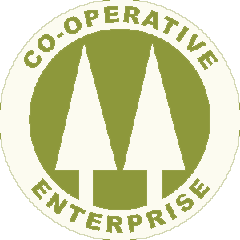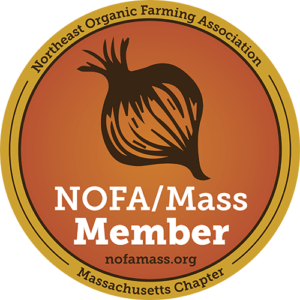
As I noted last time, on the subject of Occupy Wall Street (OWS) and Real Pickles: We are doing essentially the same work, even if employing different approaches to making change in the world, and from mostly different locales. But, some actual connections are being made these days between the two efforts. A couple weeks back, we shipped two gallons of sauerkraut as food donation to the protesters in NYC as a show of support. And, recently some staff members from Real Pickles have made opportunities to drop in on the protests. Joe Mirkin, Real Pickles’ stellar facility manager and co-production manager, joined in on the events in NYC for a weekend and came back with some thoughts to share. Here are some excerpts from an interview I did with him:
DR: What prompted you to travel down to NYC to join in with OWS?
JM: After several weeks of reading news reports, it seemed the protests were gaining steam. What at first seemed like a flash in the pan quickly turned into the genesis of a popular uprising. Hey, who doesn’t want to be part of a popular uprising? So I got restless, grabbed a couple friends, some sleeping bags, and drove down to OWS. I also have friends in NYC who had participated in the OWS protests in the weeks prior to my visit. They all said the same thing, “You gotta get down here and see it for yourself!” Which is now what I tell everybody who is interested in the goings on of OWS: Go see it for yourself!
DR: When you arrived, did you find what you were expecting? How did things match your expectations? What surprised you?
JM: Heading down there, I figured I’d find just a bunch of young people having meetings and sleeping in the park. What I encountered was deeply surprising and, for the most part, encouraging and inspiring. Volunteer cleaning crews roaming the park 24/7 collecting trash and recyclables; a composting/gray water operation for recycling food scraps; a makeshift kitchen serving thousands of decent meals every day; an extraordinarily well-stocked, well-organized People’s Library fully staffed with friendly and competent librarians offering free reading material on all matter of subjects; people of all ages and various social classes; successfully facilitated General Assembly meetings with hundreds or thousands of participants; spontaneous classes and workshops organized and attended by interested people; clothing and bedding donations arriving by the carload, all sorted by volunteers and given away for free to anyone in need.
One of the things I did expect to find was a very significant amount of police present, and that was certainly the reality. The NYPD has these surveillance towers which can raise and lower from the ground to a height of almost 30′. The only other times I’ve seen anything like them were at Obama’s inauguration in Washington, D.C., and overlooking Beale St in Memphis, TN. The police apparently prepare for the worst when it comes to large gatherings of peaceful people, whether it be in protest, in celebration, or to hear blues music and eat barbecue.
DR: How do you see OWS fitting into the work for social change that needs to happen?
JM: Having untold numbers of people marching and demonstrating in the streets everyday allows for a whole slew of other social change to take place. The primary benefit I can see is that the protests allow all the groups that were already engaged in making change to expand their imaginations on what kind of progress is possible. They can demand more in their lists of goals, they can intensify and amplify their tactics for winning change, and they can build relationships and coalitions with other groups that may not have previously had specific overlapping issues. You’ve seen all sorts of labor unions come out in support of OWS, and now you’re seeing OWS link up with other movements for change around the city. The same dynamic is playing out at Occupy protests all over the country. I don’t think the camping out part alone is going to bring down corporate greed and all its associated ills, but it does seem to be a catalyst for a more networked and energized movement for justice.
DR: What’s your assessment of the “message” coming out of OWS? What do you think of the criticism that the movement doesn’t have a clear, coherent message?
JM: The moment people at OWS begin pushing a single demand is the moment a lot of people will decide to stop participating. The real strength of the protest – the actual power that makes the city and the banks so bloody nervous – is the broad base of support OWS has. Any action taken to weed out some issues in favor of others will only weaken this power, and so it is best to avoid any such thing, in my estimation. That certainly does not preclude OWS from issuing messages about the protest, which they have done. Nor should it keep individuals from teaching and talking to others about those issues close to them, which some people do. Keeping the message as broad as the 99% of people in this country is no easy task, least of all because of the pressure from media to present clear, concise demands. But it’s well worth the effort if OWS is to maintain the strength it has gained.
DR: After posting my blog entry, “Occupy Wall Street and Organic Pickles”, we heard from a couple Real Pickles customers who were frustrated over our support for OWS. They cited several reasons for opposing the protests. One was that the protests were “disruptive”. Any thoughts about that, having participated in them?
JM: My response to that criticism is: Ask the millions of people losing their housing due to mortgage lending practices if they consider the protesters “disruptive”. Ask any farmer who’s been taken to court by Monsanto for intellectual property theft if they think OWS is “disruptive”. Ask any teacher or firefighter in Wisconsin if the word they would use to describe OWS protesters is “disruptive”. It goes on and on. Hard to imagine that a single protest in New York City can be even remotely close to being as disruptive as modern-day global neoliberal capitalism.
DR: Another criticism we heard was that direct action (i.e.-street demonstrations) is not the way to go about changing the world. Instead, it is best to follow Gandhi’s precept to “be the change you want to see in the world” and focus on, say, making organic pickles from locally-grown vegetables or buying locally-grown food. What are your thoughts about the relative importance of these different approaches to making social change?
JM: Changing the systems of food production and consumption in this country is of obvious importance to creating a better world. Sometimes in order to achieve your goal you need a diversity of tactics. Say you want to purchase food that was produced by workers who are paid fair wages. It may be as easy as going to a different store or market and maybe spending a little bit more money. But, sometimes one may have to do as the Coalition of Immokalee Workers down in Florida has done, and head out to the streets to demand that corporate grocery chains pay fair prices for hand-picked produce!




